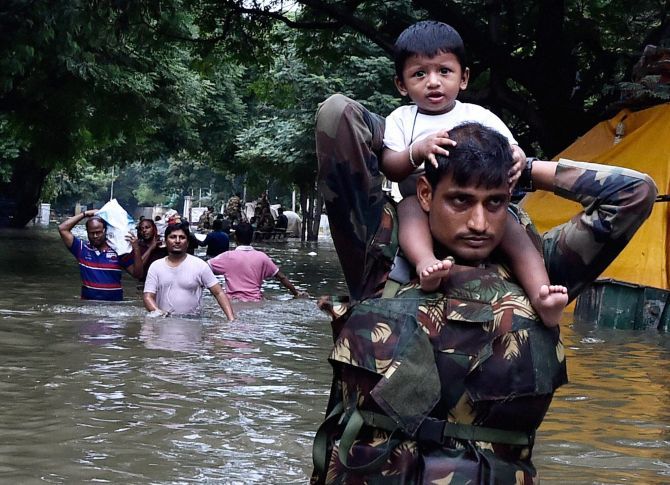 There is a thin line between a gimmick and genuine interest and brands must tread this line very carefully
There is a thin line between a gimmick and genuine interest and brands must tread this line very carefully
Any publicity is good publicity -- this is one statement branding and marketing professionals abide by. But the recent experiences of a few companies during the flood in Tamil Nadu, are putting this adage to the test.
Zomato, Ola, Uber, Cognizant and a few others have found themselves at the receiving end of people’s ire for being insensitive, simplistic and even false in the promises they made at the time of the crisis.
Even though these companies have dismissed the criticism, did some of it still stick to their brands?
Zomato was among those that faced a firing squad.
It had offered a free meal for every meal ordered.
But, then, some people lambasted them on Twitter by calling this an attempt to mask self-interest as charity.
Matters turned sour when Zomato’s founder Deepinder Goyal got into a slanging match with his critics on Twitter and although a truce was finally called, it took some time for the dust to settle.
Ola said it would provide a free boat service for all those stranded in the floods while Uber went on Twitter with #keepchennaimoving.
Both were called insensitive for pushing their brands when the city was submerged.
Chennai-based Cognizant offered Rs 260 crore (Rs 2.6 billion) to help flood-hit residents, employees and partners.
But, instead of winning people over, Cognizant was accused of seeking publicity for just doing its job -- as a large organisation with a large number of employees, it had to take care of its people affected by the crisis; but to take credit for this, was opportunistic, said many.
What did they do wrong?
According to brand consultant Harish Bijoor, brands must not undertake brand-oriented activity whenever there is a calamity.
“If you are providing any help, please don’t put stickers because then you are fishing in troubled waters for the benefit of your brand.
"Such are short-sighted branding tactics. Brands, instead, are built on long-term strategies,” he says.
The point he makes is that brands should do something, but it should be done discreetly.
“Do it anonymously because then some day, people and media will discover it and then it will work better for the brand image,” Bijoor says.
The mileage that a brand gets in that manner tends to be more beneficial than publicised charity-undertakings.
R Sridhar, founder and chief executive officer of Integrated Brand-comm says, “Anonymous charity and eventual recognition would work better than something like issuing media releases.”
When brands step into a crisis, it is important that they draw the line between social and business objectives.
To present one in the garb of another is courting disaster. Sridhar says, “I don’t see anything wrong in helping because even these companies are a part of the society.
But if they are using it for publicity, then I have a different take. I have a reservation about capitalising a situation like a natural disaster.”
However, as Deepinder Goyal retorted in a heated tweet when he was being heckled by a mob of ‘haters’, there are those that do nothing and yet take it upon themselves to criticise every good thing that someone else does.
Saurabh Parmar, founder and chief executive officer of Brandlogist Communications, takes a similar view. He feels it was not a bad idea for companies to rush in to help the affected, even if it meant a little bit of a leverage for their brands.
“It will help a company to stand out. Today it’s important for a brand to have a personality,” he said.
How does a brand deal with the backlash in that case?
The best thing to do is, do what has to be done and let the people say what they have to say.
Parmar says, “You do it or not do it, either way, the society will surprise you. It’s a catch 22 situation.
"Somewhere we (society) have become unfair.”
He gives the example of the Nepal earthquake early this year; mobile wallet and online bills payment platform FreeCharge’s missed call campaign to help the victims was tagged as a marketing gimmick.
However, when the company silently offered the recharge service for its many customers during the flood, the company was criticised for its inaction.
FreeCharge’s founder Kunal Shah, wrote on his Facebook wall: “I guess there is no right ‘right way’ but to keep doing right things.”
Brand experts believe that the strong opinions and heated debates online take place because, a lot of the times, the controversies are around the younger brands, which have been launched by young entrepreneurs.
The young founders are inexperienced and tend to react aggressively instead of letting it go.
Not everyone is critical of their efforts, however.
“They might be doing it for selfish interests, but we should also consider their RoI (return on investment) and the amount of money they are spending when they could have spent these on sales, which points towards a genuine societal interest,” says Parmar.
It is wrong, however, to look at these crises as opportunities to reap in some quick rewards; the people stranded during the Chennai floods complained about skyrocketing air fares and overcharging cabbies, for instance.
The brands that indulged in such behaviour have a rough ride ahead.
Also all the experts spoken to said that there was a thin line between a gimmick and genuine interest and brands must tread this line very carefully.
What are the limits that brands must adhere to during marketing?
“I don’t think there any rules, but making fun of a situation, especially a tragedy is a no-no,” says Parmar. Well that is an easy lesson to learn.
Image: Army personnel carry children on their shoulders as they wade through flood waters in rain-hit Chennai on Thursday. Photograph: PTI











 © 2025
© 2025